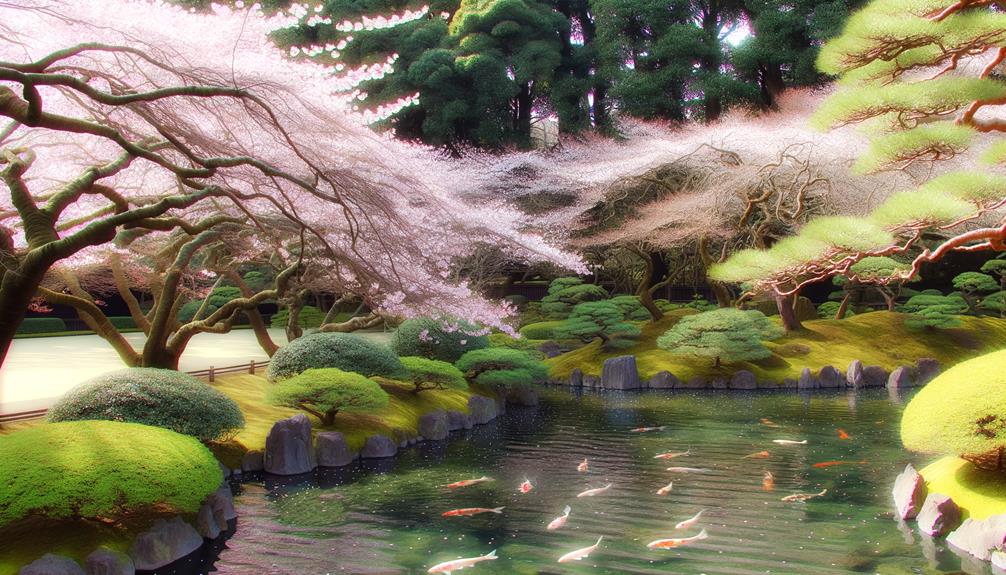Meaning of the Name Kaori
The name Kaori, of Japanese origin, is composed of kanji characters translating to "fragrance" (ka) and "weaving" or "fabric" (ori). It symbolizes aesthetic appreciation, craftsmanship, and is deeply rooted in cultural values like nature and sensory experience.
Reflecting purity, beauty, and renewal, Kaori aligns with seasonal changes and life's cycles. Its popularity in Japan endures due to its elegance and versatility across numerous kanji combinations.
Renowned musicians named Kaori highlight the name's artistic resonance. Additionally, phonetic similarities with names such as Kaoru and Kairi underscore its linguistic diversity.
Further insights reveal a richer tapestry of meanings and historical context.

Key Takeaways
- Kaori is a Japanese name meaning fragrance or perfume, derived from the kanji characters 'ka' and 'ori'.
- The name symbolizes sensory appreciation, aesthetic values, and the interplay between nature and human experience in Japanese culture.
- Kaori represents the fragrance of flowers, signifying purity, beauty, and the impermanence of life.
- It has a modern appeal and traditional elegance, making it a versatile and popular choice in Japan.
- Multiple kanji combinations for Kaori offer varied meanings, reflecting Japan's linguistic and cultural intricacy.
Origin and Etymology
The name Kaori originates from Japan and is composed of two kanji characters: 'ka' (香) meaning fragrance or perfume, and 'ori' (織) meaning weaving or fabric.
This linguistic combination suggests a nuanced interplay of sensory experiences—invoking both olfactory and tactile imagery. Historically, the use of kanji in Japanese names carries significant weight, each character meticulously chosen for its inherent meaning and phonetic value.
The kanji 'ka' (香) is often associated with pleasant aromas, symbolizing beauty and elegance. On the other hand, 'ori' (織) implies craftsmanship and intricacy, reflecting a sense of artistry and tradition. Together, these elements form a name that is both evocative and sophisticated, embodying a rich cultural heritage and an appreciation for aesthetic refinement.
Cultural Significance
In Japanese culture, the name Kaori carries profound significance, symbolizing not only the aesthetic values of beauty and craftsmanship but also the deep-rooted traditions of sensory appreciation and artistic expression.
Embedded within this name is an acknowledgment of the Japanese cultural emphasis on the delicate interplay between nature and human experience. Kaori, often associated with fragrant scents, embodies the cultural practice of valuing subtle and ephemeral qualities, reflective of Japan's historical engagement with the arts such as ikebana (flower arranging) and kodo (the art of appreciating incense).
The name Kaori, thus, transcends mere nomenclature to encapsulate a cultural ethos that reveres refined beauty and the harmonious integration of sensory experiences into everyday life.
Symbolism in Nature
The name Kaori, often associated with the fragrance of flowers, evokes the sensory beauty and ephemeral nature of blossoms, symbolizing purity and transience.
Additionally, the name reflects the dynamic essence of seasonal changes, embodying the cyclical transformation and renewal inherent in nature.
These natural elements not only enhance the name's aesthetic appeal but also imbue it with profound symbolic meaning.
Fragrance of Flowers
Frequently, the fragrance of flowers serves as a potent symbol in nature, embodying themes of beauty, renewal, and the transient nature of life.
The ephemeral quality of floral scents mirrors the fleeting moments of peak bloom, emphasizing impermanence.
Aromatic compounds released by flowers not only attract pollinators but also evoke emotional and sensory responses in humans, linking the olfactory experience to memory and sentiment.
This intricate relationship underscores the duality of fragility and strength within nature.
The name Kaori, meaning fragrance in Japanese, encapsulates this symbolism, suggesting a delicate yet profound influence.
Hence, floral fragrances are not mere sensory delights but also powerful metaphors for the cycles of existence and the enduring beauty found within moments of transience.
Seasonal Changes
Seasonal changes, marked by the cyclical shift from spring's renewal to winter's dormancy, serve as profound symbols of life's inevitable progression and essential transformation.
Spring, with its blooming blossoms and fresh scents, signifies birth and new beginnings, a time of hope and potential.
Summer's warmth and abundance represent the peak of growth and vitality, while autumn, with its falling leaves and harvests, embodies maturation and the preparation for rest.
Winter, often associated with stillness and reflection, signifies the culmination of life's cycle and the promise of renewal.
These natural shifts mirror human experiences, offering a poignant reflection of our own journeys. Understanding these patterns enhances our appreciation of both the external world and our inner lives.
Usage in Modern Japan
Widely embraced across contemporary Japanese society, the name Kaori epitomizes a blend of traditional elegance and modern appeal.
The name, often inscribed with characters denoting 'fragrance' or 'perfume,' resonates with cultural associations of refinement and beauty. Its phonetic simplicity makes it accessible and easy to pronounce, contributing to its enduring popularity.
In modern usage, Kaori is favored by parents seeking a name that harmonizes classic Japanese aesthetics with contemporary sensibilities. The name appears frequently in various media, from literature to television, reinforcing its presence in everyday life. Furthermore, Kaori’s popularity can be attributed to its melodic sound and graceful simplicity, making it a beloved choice for many families. In addition to its aesthetic appeal, parents are often drawn to the cultural significance behind names like Kaori, reflecting a deep appreciation for heritage and tradition. For those interested in exploring additional names, understanding the meaning and origin of the name Karter can provide insight into the evolving landscape of contemporary naming practices.
Additionally, Kaori's versatility in kanji combinations allows for personal customization, enabling parents to imbue the name with unique meanings and significance, thereby enhancing its appeal in today's Japan.
Popularity and Trends
Reflecting its harmonious blend of tradition and modernity, the name Kaori has experienced varying levels of popularity over the decades, influenced by cultural shifts and evolving naming trends in Japan.
During the 1980s and 1990s, Kaori saw a significant surge in usage, encapsulating an era where names with positive, nature-inspired connotations were favored.
However, the early 2000s marked a decline as newer, more contemporary names began to emerge.
Despite this, Kaori has retained a steady presence, attributed to its timeless appeal and the resurgence of vintage names in recent years.
The name's enduring charm lies in its dual capacity to honor cultural heritage while remaining relevant within modern naming conventions, making it a versatile choice for many parents.
Famous Personalities Named Kaori
The name Kaori has been associated with a variety of notable personalities across different fields. Renowned Japanese actresses such as Kaori Momoi have made significant contributions to cinema, while influential anime characters bearing the name enhance its cultural resonance.
Additionally, acclaimed musicians like Kaori Muraji highlight the name's presence in the world of classical music, further underscoring its widespread impact.
Renowned Japanese Actresses
How has the name Kaori become synonymous with talent and versatility in the domain of Japanese cinema, as evidenced by the illustrious careers of renowned actresses who bear this name?
The name Kaori has indeed left an indelible mark on the industry through the exceptional contributions of several notable figures:
- Kaori Momoi: An award-winning actress known for her roles in both domestic and international films, such as *Memoirs of a Geisha*.
- Kaori Mizushima: A versatile performer celebrated for her work in television dramas and stage productions, exemplifying her broad range of acting skills.
- Kaori Takahashi: A respected actress who has garnered critical acclaim for her performances in various independent films and mainstream movies.
These actresses collectively showcase the depth and breadth of talent associated with the name Kaori in Japanese cinema.
Influential Anime Characters
Several influential anime characters named Kaori have left a significant impact on audiences, demonstrating the name's association with depth, complexity, and emotional resonance in storytelling.
Eminently, Kaori Miyazono from 'Your Lie in April' exemplifies this trend. Her character, a prodigious violinist, brings life and color to the story, while her battle with a terminal illness adds profound layers of poignancy and inspiration.
Similarly, Kaori Kanzaki from 'A Certain Magical Index' showcases formidable strength and moral complexity as a skilled swordswoman maneuvering through a morally ambiguous world.
These characters, among others, underscore the name Kaori's resonance within anime, embodying traits that range from artistic brilliance to moral fortitude, thereby enriching the narrative fabric and emotional depth of their respective series.
Acclaimed Musicians Named Kaori
Renowned for their contributions to the music industry, several musicians named Kaori have distinguished themselves with their exceptional talent and artistic innovation. Their unique abilities and dedication to their craft have earned them critical acclaim and a devoted following.
- Kaori Muraji – A classical guitarist celebrated for her technical proficiency and expressive performances. Her interpretations of both contemporary and classical pieces have garnered international recognition.
- Kaori Kobayashi – A jazz saxophonist known for her dynamic live performances and soulful improvisation. Her work seamlessly blends traditional jazz elements with modern influences.
- Kaori Ishihara – A singer and voice actress whose versatile vocal range and emotive delivery have made her a prominent figure in anime and J-pop music scenes.
Variations and Similar Names
Kaori's variations and similar names often reflect subtle cultural and linguistic nuances that contribute to its rich etymological tapestry.
In Japanese, Kaori can be written with different kanji characters, each imparting unique meanings, such as 香 (fragrance) or 郁 (culture).
Variations like Kaoru, another unisex name, share phonetic similarities but diverge in their kanji representations and meanings.
Additionally, names like Kari and Kairi, while not strictly Japanese, resonate phonetically and sometimes culturally. These names exemplify how slight modifications in pronunciation or script can yield distinct implications.
The diversity in Kaori's variations underscores Japan's linguistic intricacy and the broader spectrum of names that evoke similar aesthetic or phonetic qualities across different cultures.
Choosing the Name Kaori
Building on the rich tapestry of Kaori's variations and similar names, choosing Kaori involves a thoughtful consideration of its cultural significance, phonetic appeal, and the unique meanings embedded in its kanji representations.
To aid in making an informed decision, consider the following aspects:
- Cultural Significance: Kaori is deeply rooted in Japanese tradition, often associated with nature and beauty, reflecting values and aesthetics inherent in the culture.
- Phonetic Appeal: The name Kaori is melodious and easy to pronounce, which adds to its universal charm and accessibility.
- Kanji Variations: Different kanji characters for Kaori can represent a variety of meanings, such as 'fragrance' (香), 'woven' (織), or 'beautiful' (佳). Each choice offers a unique dimension to the name's significance.
Conclusion
The name Kaori, with its rich origins and cultural significance in Japan, symbolizes both natural beauty and modern relevance. Of particular mention, it has seen fluctuating popularity, peaking in the late 20th century.
A fascinating statistic reveals that in 1985, Kaori was among the top 10 most popular names for girls in Japan. This illustrates its enduring appeal and the cultural shifts in naming trends.
Such detailed analysis underscores Kaori's multifaceted significance in Japanese society.






